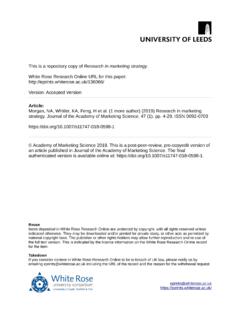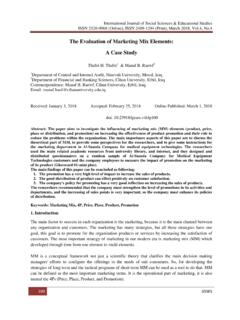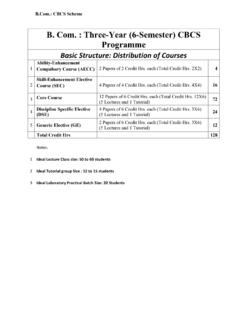Transcription of Tribhuvan University Faculty of Management
1 Tribhuvan University Faculty of Management Office of the Dean Course details of MBS (Master of Business Studies) 1st Semester MKT 511: marketing Management 3 Cr. hrs ECO 512: Managerial Economics 3 Cr. hrs MSC 514: Statistical Methods 3 Cr. hrs MGT 515: Organizational Behavior 3 Cr. hrs MGT 519: Managerial Communication 3 Cr. hrs Effective from 2018 Admission Batch MKT 511: marketing Management Credits: 3. Lecture Hours: 48. Course Objectives The objective of this course is to equip students with knowledge and skills to take decisions in marketing Management . Course Description This course deals on the Management aspects of marketing . It includes a study of the marketing system and organization, environment and segment analysis, information system, demand analysis, buyer analysis and competitor analysis, strategic marketing planning, implementation of marketing program and marketing control.
2 Course Details Unit 1: Introduction LH 6. Definition of marketing and Core marketing Concepts Company Orientation Towards the Market Place Customer Value, Satisfaction and Creating Long Tern Loyalty Relationship Concept of marketing Management marketing Management Process Unit 2: marketing Opportunity Analysis LH 6. Macro Environmental Trend and forces Corporate and Division Strategic Planning, Business Unit Strategic Planning Assigning Resources to SBUs: SBU Model, BCG Model and GE Model Nature and Contents of a marketing Plan Unit 3: marketing Information System and Demand Measurement LH 6. marketing Information System and its Components marketing Research: Areas and Process Market Demand and Its Measurement Methods of Estimating Current and Future Market Demand Practice of marketing Information System(MKIS) in Nepal Unit 4: Identifying Market Segment, Target and Position Strategies LH 6.
3 Bases for Consumer and Industrial Market Segmentation Process of Market Segmentation Evaluation and Selection of Target Market Developing Positioning Strategies Market Segmentation Practices in Nepal Unit 5: Competitors Analysis LH 4. Concept of Competition Key Competitor Analysis Competitive Strategies for Market Leader Competitors Analysis in Nepal Unit 6: Implementation of marketing Program: Product Strategies LH 8. Concepts and Types of New Products New Product Development Process Product Line and Product Mix Strategies Brand Positioning, Branding Policies and Strategies marketing Strategies in the Various Stages of Product Life Cycle Product and Branding Practice in Nepal Unit 7: Implementation of marketing Program: Pricing Strategies LH 4. Objectives and Methods of Pricing Developing Pricing Strategies and Program Pricing Practices in Nepal Unit 8: Implementation of marketing Program: Channel & Logistic Strategies LH 3.
4 Selection of Channel Design Decision Channel Dynamics Logistics Management Decisions Distribution System in Nepal Unit 9: Implementation of marketing Program: Integrated marketing Communication Strategies LH 3. Designing and Managing Integrated marketing Communications Steps in Developing Effective Communication Promotion Practices in Nepal Unit 10: Evaluation and Control of marketing LH 2. Concept of marketing Control Types of marketing Control marketing Control in Nepal Note: At least one case study should be conducted after the completion of each chapter. Basic Books Kotler,P & Keller, marketing Management , New Delhi, Person Education Limited. Reference Books Aaker D., Strategic Market Management , Singapore John, Wiley & Sons, Stanton, E. and Walker, , Fundamentals of marketing , MC Graw Hill International Editions. ECO 512: Managerial Economics Credits: 3. Lecture Hours: 48. Course Objective The course aims to develop students' knowledge and skills in the tools and techniques of economics applicable to managerial decision making.
5 Course Description: This course deals with introduction to managerial economics and theories of firm, demand forecasting, production and cost analysis, pricing theory and practice, risk analysis, and market efficiency and role of government. Course Details Unit 1: Introduction to Managerial Economics and Theories of Firm LH 7. (a) Concept and scope of managerial economics, Managerial economics and business decision- making. (b) Business profit and economic profit. (c) Theories of firm: Profit maximisation, Value maximisation, Sales revenue maximisation, Williamson's model of managerial discretion. Unit 2: Demand Analysis and Forecasting LH 8. (a) Concept and significance of demand forecasting. (b) Techniques of demand forecasting: Survey methods, Market experiment, Time series analysis, Moving average method, Regression analysis, Barometric technique. (c) Use of elasticities of demand in business decision making.
6 (d) Limitations of forecasting. Unit 3: Production and Cost Analysis LH 5. (a) Production function: Short run production function, Long run production function, Cobb-Douglas production function. (b) Optimal use of one variable input and two variable inputs. (c) Learning curve, Empirical estimation of short run cost function Unit 4: Pricing Theory and Practice LH 14. (a) Pricing under oligopoly: Cartel arrangement, Price leadership, Kinked demand curve model. (b) Strategic behaviour and game theory: Concept, Payoff matrix, Nash equilibrium, Prisoner's dilemma, Simultaneous move one shot game, Simultaneous move repeated game, Multistage game (c) Pricing techniques: Cost-plus pricing, Incremental cost pricing, Predatory pricing, Multiple product pricing (fixed proportion), Transfer pricing, Peak-load pricing, Two-part tariff. (d) Economics of discriminations: Wage differential, Price discrimination Unit 5: Risk Analysis LH 4.
7 (a) Concept of risk and uncertainty (b) Attitude toward risk and uncertainty: Utility Theory and risk aversion (c) Information and risk: Asymmetric information, Adverse selection, Signaling, Moral hazard, Principal -agent problem Unit 6: Market Efficiency and Role of Government LH 10. (a) Market and efficiency: Effect of government policy (tax and price control policy) in market equilibrium and market efficiency (b) Market failure: Concept and sources of market failure: Market power and deadweight loss, Incomplete information, Externalities, Public goods. (c) Government response to market failure: Rationale for regulation, Monopoly regulation, Antitrust policy, Patent system, Operating controls, Subsidy policy, Tax policy, Regulation of environmental pollution. (d) Regulation of international competition. (e) Problems of regulation, effects of regulation on efficiency. (e) Government failure: Theory of public choice.
8 Note: Numerical illustrations and case analysis will be used wherever applicable. Reference Books: Adhikari, , Paudel, and Regmi, K. (2017). Managerial Economics. Kathmandu: KEC. Publication and distributors Dhakal, R. (2017). Managerial Economics. Kathmandu: Samjhana Publication Mansfield, E. (1996). Managerial economics. New York: Norton and Co. Petersen, and Lewis, (2008). Managerial Economics. New Delhi: Pearson Education Ltd. Pappas, and Hirschey, M. (1989). Fundamentals of Managerial Economics. New York: The Dryden Press. Salvatore, D. (2012). Managerial Economics. New York: McGraw Hill. MSC 514: Statistical Methods Credits: 3. Lecture Hours: 48. Course Objectives The course aims to impart knowledge and skills of statistical techniques ad their applications in solving business problems Course Details Unit 1: Probability LH 6. Concept and importance of probability, approaches to probability.
9 Additive and multiplicative theorems, conditional probability, Baye's theorem and decision tree. Unit2: Probability Distribution LH 6. Discrete probability distribution: Binomial and Poisson, Continuous probability distribution: Normal Distribution and their properties along with applications. Unit 3: Sampling and Estimation LH 6. Sampling techniques, sampling and non-sampling errors, sampling distribution, standard error, application of standard error, concept of central limit theorem Estimation theory, criteria of good estimator, point and interval estimate, relationship among errors, risk and sample size, determination of sample size Unit 4: Testing of Hypothesis LH 18. Meaning of hypothesis testing, types of error in hypothesis testing, critical region, one tailed and two tailed test, Parametric Test: large sample test of mean and proportions, small sample test of mean, paired t-test, test of significance of correlation coefficient, variance ratio test, one way and two way Analysis of Variance (ANOVA), Non-parametric test: Chi-square test of goodness of fit and independence of attributes, chi-square test for population variance.
10 Unit 5: Correlation and Regression Analysis LH 12. Partial and multiple correlation , coefficient of determination , concept of linear and non- linear regression , multiple regression equation , standard error of estimate for multiple regression, test of regression model and regression coefficients, auto-correlation and multicollinearity , Residual analysis: Linearity of the regression model, Homoscedasticity , Normality of error. Reference Books Richard I. Levin and David S. Rubin, Statistics for Management , Prentice Hall of India , Fundamental of Statistics, Himalayan Publishing House MGT. 515 Organizational Behavior Credits: 3. Lecture Hours: 48. Course objectives The major objectives of this course is to provide students with an in-depth understanding of behavioral processes and thereby enable them to function more effectively in their present or future roles as managers of human resources.




